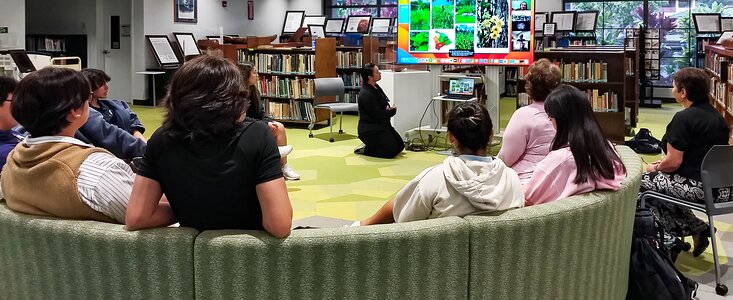Students in Chile and Hawai‘i United by the Stars
Virtual cultural exchange by NOIRLab and AURA brings students from Vicuña and Hilo 10,000 kilometers closer
21 November 2023
On 31 October NOIRLab and AURA held an hour and a half virtual cultural exchange between students in Vicuña (Chile) and in Hilo (Hawai‘i, US), the nearest towns to the twin telescopes of the International Gemini Observatory, a Program of NSF NOIRLab.
'Brother of the Stars' connected students at two schools, near Gemini North in Hawai‘i and Gemini South in Chile. The goal was for the students to share their stories of their relationship with the skies and what life is like living in each location.
Around 20 middle-school students from Edmundo Vidal Cárdenas School in Vicuña and from Kamehameha Schools in Hawai‘i came together to discuss what it is like to live in their respective communities. The students talked about what they enjoy doing in their free time and what sports they enjoy playing, and exchanged some words in their respective languages. They also shared each location’s traditions and even tried each other’s traditional dances.
The cultural exchange was held as part of the Month of Stars organized by Vicuña Municipal Tourism Corporation and the Municipality of Vicuña. The coordinator of the exchange in Chile, Luz María Aguirre, the Communications and Institutional Relations Manager at AURA, noted that though the students were separated by more than 10,000 kilometers their enthusiasm let them share their cultures as if they were in the same classroom.
The Mayor of Vicuña, Rafael Vera, said, “We are proud of this event and we believe that this partnership should continue over time.”
Ricardo Contreras, a teacher at the school in Vicuña said, “As an English teacher, I cherish the opportunity that our students had to practice the language that they’re learning. The objective is to communicate; it is something our students have been putting into practice for years with initiatives like these where language is the common ground, and with which they can interact, regardless of the territorial and cultural differences that separate them.”
This event was supported in Hawai‘i by Emily Peavy, NOIRLab's Education and Engagement Senior Assistant, who remarked: “Brother of the Stars was such a unique event and a wonderful opportunity for students in Hawaiʻi and Chile to connect with each other, share their cultures, and celebrate the similarities and differences in their perspective of the stars.”
More information
NSF NOIRLab (National Optical-Infrared Astronomy Research Laboratory), the US center for ground-based optical-infrared astronomy, operates the International Gemini Observatory (a facility of NSF, NRC–Canada, ANID–Chile, MCTIC–Brazil, MINCyT–Argentina, and KASI–Republic of Korea), Kitt Peak National Observatory (KPNO), Cerro Tololo Inter-American Observatory (CTIO), the Community Science and Data Center (CSDC), and Vera C. Rubin Observatory (operated in cooperation with the Department of Energy’s SLAC National Accelerator Laboratory). It is managed by the Association of Universities for Research in Astronomy (AURA) under a cooperative agreement with NSF and is headquartered in Tucson, Arizona. The astronomical community is honored to have the opportunity to conduct astronomical research on Iolkam Du’ag (Kitt Peak) in Arizona, on Maunakea in Hawai‘i, and on Cerro Tololo and Cerro Pachón in Chile. We recognize and acknowledge the very significant cultural role and reverence that these sites have to the Tohono O’odham Nation, to the Native Hawaiian community, and to the local communities in Chile, respectively.
Links
Contacts
Luz María Aguirre
Communications and Institutional Relations Manager
AURA
Email: LAguirre@aura-astronomy.org
Emily Peavy
Education & Engagement Senior Assistant
NSF NOIRLab
Email: emily.peavy@noirlab.edu
Josie Fenske
Jr. Public Information Officer
NSF NOIRLab
Email: josie.fenske@noirlab.edu



